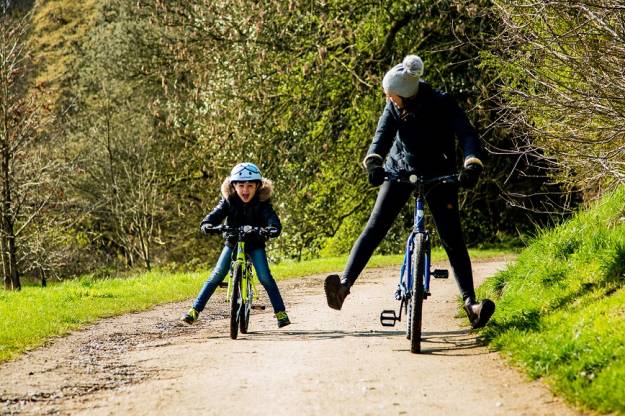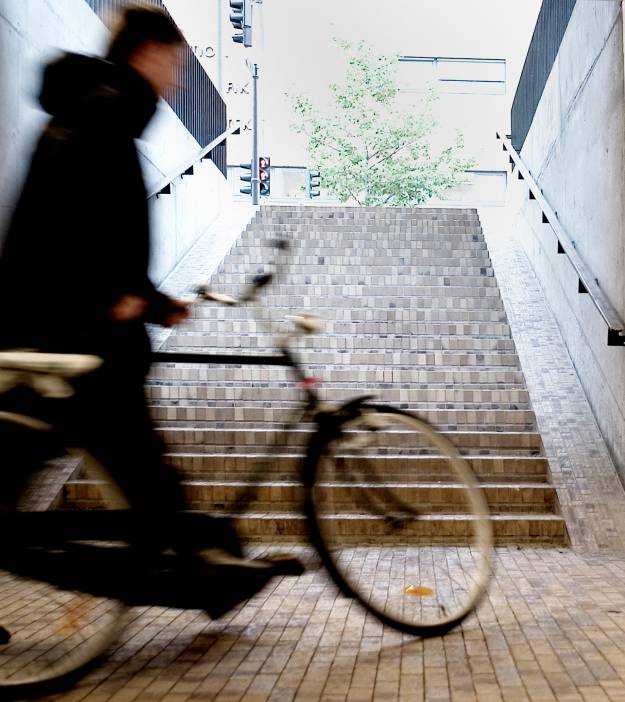With just two weeks to go until next month’s general election, each of the seven major parties have now released their full manifesto. Covering everything from protected cycle lanes to play streets, our Policy Manager Nick Chamberlin has sifted through the manifestos to produce this quick guide to all things cycling.
Conservatives
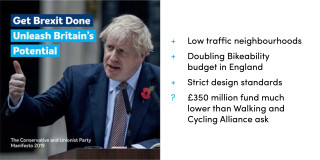
There are several encouraging notes included in the Conservative manifesto, including the long-awaited publication of updated design standards for cycling infrastructure (based on those currently used in London), and working with local councils to create low-traffic “healthy neighbourhoods” – like those which have proved so successful through London’s Mini-Holland programme.
Despite this, the only funding commitments included are a doubling of the Bikeability budget and a new £350 million infrastructure fund – which fall well short of the Walking and Cycling Alliance (WACA) spending ask of at least 10% of the transport budget by 2025. It is currently unclear where any further ring-fenced funding for cycling or walking would come from.
Read the full manifesto here.
Labour
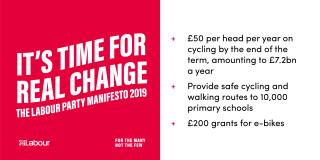
While the Labour party manifesto was originally light on detail, a separate announcement on cycling and walking made on November 30th promises £50 per head per year on cycling by the end of the term, amounting to £7.2bn a year – which is even greater than the Walking and Cycling Alliance ask.
Other commitments include £200 grants for e-bikes, safe cycling and walking routes to 10,000 primary schools and an expansion of the Bikeability programme to include all primary and secondary school children – and even making it available to adults too.
The party has also committed to delivering universal affordable access to bicycles and social prescribing of cycling on prescription.
The plans unveiled are undoubtedly the most ambitious of all the major parties, however there are question-marks over how much could feasibly be delivered in a government’s first term.
Read the full manifesto here.
Liberal Democrats
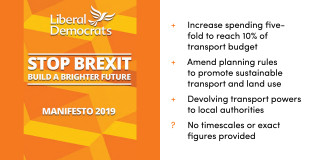
The Liberal Democrats are leading the charge in terms of a bold funding commitment, to increase spending on walking and cycling five-fold to reach 10% of the transport budget – in line with the WACA funding ask.
Other positive points include amending planning rules to promote sustainable transport and land use, and a commitment to further devolve transport powers to local authorities – which is one of the key asks of Britain’s cycling and walking commissioners, including Chris Boardman and Dame Sarah Storey, which were released earlier this year.
There could however be more clarity on how the allocated funding would be spent – and when the 10% figure would be reached by.
Read the full manifesto here.
Green Party
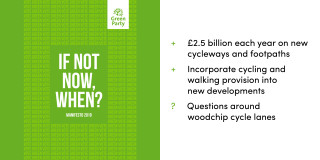
The Green Party’s Green New Deal included the largest funding commitment of any party in their manifesto – totalling £2.5 billion each year on new cycleways and footpaths – while we are also very supportive of their ambition to create more “Low Traffic Neighbourhoods” and ensure that active travel provision is incorporated into new developments. The Green Party are also the only party to commit to Vision Zero (that there should be no fatalities or serious injuries as a result of road traffic collisions).
Following the publication of the party’s manifesto there was plenty of debate around the claim that they would be “built using sustainable materials, such as woodchips and sawdust”, something which – to our knowledge – hasn’t yet been trialled anywhere in Britain.
Read the full manifesto here.
Brexit Party

Rather than a traditional manifesto the Brexit Party have instead published a much shorter “Contract with the People”, which doesn’t reference cycling or active travel.
Read the Contract with the People here.
SNP
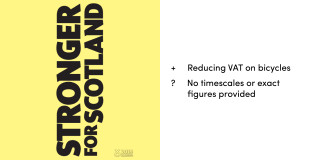
The SNP are the only party to include a specific measure to reduce the cost of bicycles, by reducing VAT. That is however the only reference to cycling in the manifesto, though it should be added that transport policy is largely devolved in Scotland and the SNP have a track record of investing in active travel while in power in Holyrood.
Read the full manifesto here.
Plaid Cymru
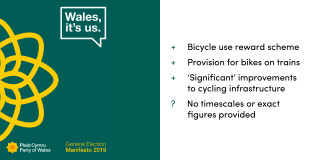
Finally, Plaid Cymru have vowed to “increase spending on active travel routes and promote walking and cycling”, and to bring about “significant improvements to cycling infrastructure” – though there is no detail on the amount of funding, timescales or targets.
Plaid Cymru are the only party to commit to “develop a scheme where participants are paid for every mile they cycle to work” and “providing train carriages with enough room for bicycles” – both of which British Cycling is supportive of, in principal.
Read the full manifesto here.
While we have chosen to include the commitments made by the SNP and Plaid Cymru in this round-up, we would like to reiterate that transport budgets in Scotland and Wales are devolved, and both parties have previously announced spcific active travel policies while campaigning for elections to their devolved assemblies. You can read Plaid's manifesto for the 2016 Welsh Assembly election here, and the SNP's manifesto for the 2016 Scottish Parliament election here.
Our view
While some of the funding commitments aren’t as explicit or as bold as we’d have liked, this is certainly a real step change from elections of the past and it is at least refreshing to see parties talking about cycling as part of the wider transport mix. If the next Government is serious about making a dent in the quarter of all carbon emissions which come from the transport sector, diverting funding from costly road schemes to improve provision for people travelling by bike is going to be absolutely critical.
Practical actions to lower speeds, enforce safe driving and improve the hostile environment on many roads, especially rural routes that are not suitable for segregated infrastructure, is detail that we never expected to see in a manifesto but needs to appear in any future policy programme.
Whichever party finds itself in power on December 13th, there is serious work to be done beyond these manifesto commitments to ensure that the Department for Transport and local authorities are equipped to spend any increase in funding quickly, efficiently and most importantly, well. This is something which we look forward to engaging the new Government on in the new year as part of the Walking and Cycling Alliance.
Nick Chamberlin, British Cycling Policy Manager






